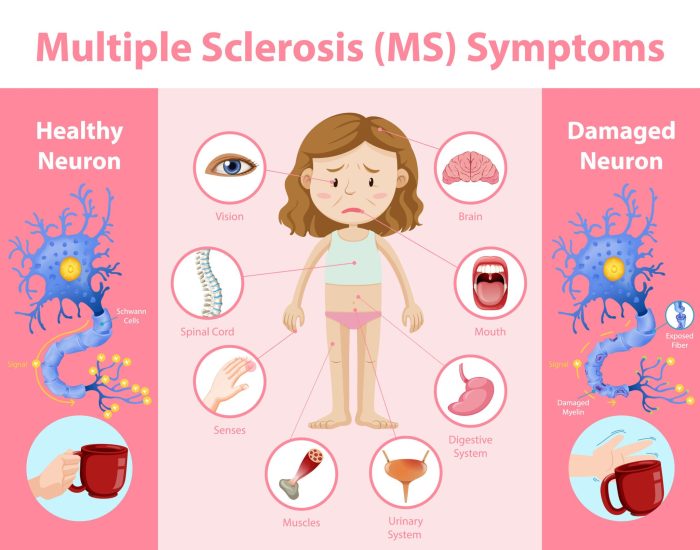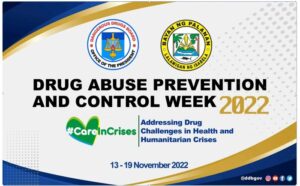
MS symptoms are like surprise guests at a party—uninvited and often unpredictable! They can swing from fatigue that feels like carrying the weight of a thousand elephants to tingling sensations that make you feel like you’ve just been zapped by a lightning bolt. In this delightfully chaotic journey through Multiple Sclerosis, we’ll break down the common symptoms, the delightful differences between various types of MS, and how no two journeys are the same—because who doesn’t love a bit of variety in life?
But it doesn’t stop there! We’ll also dive into how these pesky symptoms influence daily living, quality of life, and even play a role in mental health. Plus, we’ll touch on how to tango with other health conditions like diabetes while managing MS. So, buckle up—it’s going to be a wild ride!
MS Symptoms Overview
Multiple Sclerosis (MS) is a condition that’s about as straightforward as a cat trying to fit into a box that’s too small. It’s a complex tapestry of symptoms that vary widely from person to person, much like different flavors of ice cream. Some people experience more of the fruity sorbet variety, while others are drowning in a rich chocolate fudge.
Understanding these symptoms is essential for managing life with MS, whether you’re an ice cream aficionado or a default vanilla lover.The symptoms of MS can be more unpredictable than a toddler with a sugar rush. Common manifestations include fatigue, visual disturbances, motor control issues, and cognitive challenges. They can emerge as a single episode or wave in and out like an enthusiastic tide.
Each type of MS—be it Relapsing-Remitting MS, Primary Progressive MS, or Secondary Progressive MS—can present its own unique set of symptoms, making the experience akin to playing a never-ending game of symptom roulette.
Common Symptoms of Multiple Sclerosis
When it comes to MS, some symptoms are more common than a pizza delivery on a Friday night. Here’s a deeper dive into the usual suspects:
- Fatigue: This isn’t just your average “I stayed up too late” tired; it’s more like running a marathon in your sleep. MS fatigue can hit like a freight train, leaving individuals feeling as if they’ve run out of battery life, even after a full night’s sleep.
- Visual Disturbances: Blurred or double vision can make you feel like you’ve just stepped off a funhouse mirror ride. This symptom arises from inflammation of the optic nerve and can vary dramatically in duration and intensity.
- Motor Control Issues: You may find yourself channeling your inner toddler, with clumsiness or difficulty walking. It’s as if your body forgot the choreography to the dance of life, leaving you doing the awkward shuffle instead.
- Cognitive Challenges: Cognitive fog can make even the simplest tasks feel like trying to solve a Rubik’s Cube blindfolded. Issues with memory, attention, and processing speed can pop up unexpectedly.
- Sensory Changes: Tingling, numbness, or “pins and needles” sensations can be as surprising as finding an extra fry at the bottom of the bag. These sensations often occur in the limbs and can be fleeting or persistent.
Differentiating Symptoms by Type of MS
The type of MS one is diagnosed with can dramatically shape the symptom experience, much like how the type of pizza (thin crust, deep dish, or gluten-free) can affect your dining delight. Here’s a quick guide:
- Relapsing-Remitting MS (RRMS): Characterized by flare-ups of new symptoms or worsening of old ones, followed by periods of recovery. It’s like a roller coaster, with ups and downs that can leave you dizzy.
- Primary Progressive MS (PPMS): This type is a steady climb, with gradual worsening of symptoms from the outset without relapses. Think of it as a slow-pouring cup of coffee—consistent but with a definite kick.
- Secondary Progressive MS (SPMS): This often follows an initial relapsing-remitting course and is marked by a gradual intensification of symptoms and disability over time. It’s like finding out your favorite show has been canceled—disappointing but sadly predictable.
Variability of Symptoms Among Individuals
Each person with MS is unique, exhibiting a distinct combination of symptoms that can change over time. This variability can make it feel like you’re trying to predict the weather in a tropical storm: unpredictable, often sunny, but occasionally torrential. Factors influencing this variability can include:
- Genetics: Your genetic makeup can play a significant role in how MS manifests. Some folks may have a milder course while others may experience more severe symptoms.
- Age of Onset: Younger patients often experience different symptoms compared to those diagnosed later in life. It’s like the difference between being handed a Lego set at age six versus age sixteen—one might be a bit easier to manage!
- Overall Health: Pre-existing conditions or lifestyle choices can influence symptom severity. Someone with a more active lifestyle may cope differently than someone who is more sedentary.
“MS is not a one-size-fits-all condition; it’s more like a custom-tailored suit—fits some perfectly, but can be a little snug for others!”
Keep in mind that the MS journey is as individual as a snowflake; no two experiences are alike, and that’s what makes the community both challenging and fascinating. Embrace the quirks, take it one day at a time, and don’t forget to laugh along the way!
Health Implications of MS
Multiple Sclerosis (MS) isn’t just a fancy medical term tossed around at cocktail parties; it’s a condition that can impact every facet of daily living. Think of it as an unwelcome guest that overstays its welcome, showing up at the most inconvenient times. MS symptoms can throw a wrench into even the simplest of tasks, affecting mobility, energy levels, and cognitive functions.
As a result, individuals may find themselves trading in their hiking boots for a cozy couch where the remote control becomes their best friend. The health implications of MS extend far beyond physical limitations, often leading to a tangled web of mental health challenges. When your body feels like it’s playing an uninvited game of Twister, it’s no wonder that anxiety and depression can sneak in like an uninvited guest.
Those fatigue-fueled days can leave people feeling less like vibrant humans and more like the soggy end of a sponge.
Impact of MS Symptoms on Daily Living and Quality of Life
Navigating life with MS can feel like trying to juggle flaming torches while riding a unicycle—it’s a delicate balance that can easily be disrupted. Symptoms can impact everything from going grocery shopping to enjoying a leisurely walk in the park. Here are several ways MS can change the daily landscape:
- Mobility Challenges: For many, getting from point A to point B can require a battle plan worthy of a military operation. Balance issues and muscle weakness can make even the most straightforward errands feel like a hike up Mount Everest.
- Fatigue Overload: Forget about “powering through” or “pushing through”—MS fatigue is like that clingy friend who just won’t let go. It can hit you like a freight train, making plans feel more like a chore than a choice.
- Cognitive Fog: Known affectionately as “MS fog,” this can create a haze where even the simplest of tasks feel like solving a Rubik’s Cube blindfolded. Remembering names, organizing thoughts, or even following a conversation can sometimes be a Herculean task.
- Social Impact: The unpredictability of MS symptoms can lead to social withdrawal. Friends may not understand, and isolation can creep in, making the world feel like a secluded island.
“Living with MS is like being on a roller coaster—there are highs, lows, and times when you just want to get off!”
Relationship Between MS Symptoms and Mental Health Issues
The intertwining of MS symptoms and mental health is like a well-rehearsed duet that nobody wanted to hear. The challenges presented by MS can lead to a considerable uptick in feelings of anxiety and depression. When your physical body feels like it’s constantly battling against itself, mental well-being can take a backseat. Here’s how they relate:
- Emotional Roller Coaster: The unpredictability of MS can cause emotional turmoil, leading to anxiety over potential flare-ups and what tomorrow might bring.
- Depressive Symptoms: Constant fatigue and physical limitations may lead to feelings of hopelessness, making it hard to see the silver lining in any cloud.
- Social Isolation: Withdrawal from social activities often stems from the fear of being judged or not understood, exacerbating feelings of loneliness and despair.
- Compounding Stress: The stress of managing a chronic illness can lead to an overwhelming sense of pressure, igniting mental health issues and creating a vicious cycle.
Management of MS Symptoms Alongside Other Health Conditions
Managing MS involves a comprehensive approach that takes into account the potential for coexisting health conditions, like diabetes. Picture it like running a three-ring circus; you’ve got to juggle the elephants (MS), the clowns (diabetes), and the tightrope walkers (mental health) all at once. Here are some strategies to harmonously manage these conditions:
- Integrated Care Plans: Collaborating with healthcare providers to create a tailored plan that addresses both MS and diabetes can help streamline treatment and reduce complications.
- Balanced Diet: Nutrition plays a vital role in managing both conditions. A healthy diet can positively affect energy levels, mood, and overall well-being—think of it as a buffet where everyone is friends.
- Regular Exercise: Engaging in physical activity, as recommended by healthcare providers, can enhance mobility and mental health, acting like a superhero cape for your well-being.
- Mindfulness and Stress Management: Techniques such as yoga, meditation, or even a good old-fashioned laugh fest with friends can help reduce stress and improve mental health, making the circus feel a little less chaotic.
Treatment and Management Strategies

Living with Multiple Sclerosis (MS) can feel like trying to juggle flaming swords while riding a unicycle on a tightrope. But fear not! There are various treatment options available that can help you maintain your balance and keep those swords (and symptoms) at bay. From medication to lifestyle changes, let’s dive into how to manage those pesky MS symptoms like a pro.
Current Treatment Options for Alleviating MS Symptoms
There is a smorgasbord of treatment options available for individuals dealing with MS symptoms. They range from pharmacological therapies to lifestyle modifications. The primary aim is to alleviate symptoms and enhance the quality of life. Here are some notable treatments:
- Disease-Modifying Therapies (DMTs): These are the heavyweights in the ring, aiming to slow the progression of MS. Medications like interferons (Avonex, Rebif) and monoclonal antibodies (Ocrevus, Tysabri) help reduce the frequency of flare-ups and delay disability.
- Steroids: When symptoms flare up like a bad case of acne during prom season, corticosteroids such as methylprednisolone can help reduce inflammation and manage those acute attacks.
- Symptomatic Treatments: Think of these as the trusty sidekicks. Medications like baclofen, gabapentin, and amantadine are used to tackle specific symptoms, like muscle spasms and fatigue.
Lifestyle Changes and Exercises Beneficial for Managing MS Symptoms
While medications do their magic, lifestyle changes can add a sprinkle of fairy dust to your MS management plan. Here’s a guide to making those changes a reality:Engaging in regular exercise is like giving your body a VIP pass to the wellness club. It doesn’t need to be an Ironman competition! Gentle physical activities can significantly ease MS symptoms. Here are some recommended lifestyle changes and exercises:
- Exercise Regularly: Low-impact activities like swimming, yoga, and walking can improve your mobility and reduce fatigue.
- Maintain a Healthy Diet: A balanced diet rich in fruits, vegetables, lean proteins, and healthy fats can boost your immune system. Think of it as fuel for your superhero powers!
- Stay Hydrated: Drinking plenty of water keeps your body functioning like a well-oiled machine. Dehydration can exacerbate fatigue, so make water your best friend.
- Stress Reduction: Techniques such as meditation, mindfulness, or even a good laugh (yes, laughter is therapeutic) can help keep stress levels in check.
Effectiveness of Various Therapies for Treating MS Symptoms
In the grand arena of MS treatment, different therapies can take center stage for symptom management. Evaluating the effectiveness of these therapies can help determine the best personal approach. Here’s how some of them stack up:
| Therapy Type | Effectiveness | Notes |
|---|---|---|
| Emotional Freedom Techniques (EFT) | Moderately effective | Some users report improved emotional well-being and reduced stress levels, making them feel like they’ve just conquered a dragon. |
| Physical Rehabilitation | Highly effective | Structured physical therapy helps improve mobility, strength, and balance, akin to having a personal trainer who doubles as a cheerleader. |
| Cognitive Behavioral Therapy (CBT) | Effective | This therapy can help manage anxiety and depression, allowing individuals to tackle MS with a positive mindset and maybe even a cape! |
“Managing MS is about finding a balance between treatments, lifestyle adjustments, and a sprinkle of humor!”
Outcome Summary

As we wrap up our exploration of MS symptoms, it’s clear that while they can be as annoying as a mosquito buzzing in your ear, understanding them can empower those affected. We’ve danced through daily challenges, treatment strategies, and lifestyle changes that can make a world of difference. Remember, while MS brings its own set of hurdles, knowledge and support can help turn those hurdles into mere speed bumps on the road to living life to the fullest!
FAQ
What are the most common MS symptoms?
Common MS symptoms include fatigue, numbness, difficulty walking, and blurred vision—basically, your body’s way of keeping you on your toes!
Can MS symptoms change over time?
Absolutely! MS symptoms can evolve like a plot twist in a soap opera, sometimes improving, sometimes worsening, depending on the individual and their treatment.
How does MS affect mental health?
MS can lead to mental health issues such as anxiety and depression, often stemming from the stress of coping with the unpredictable nature of the condition.
Are there lifestyle changes that can help manage MS symptoms?
Yes! Regular exercise, a balanced diet, and stress management techniques can all help keep those MS symptoms in check. It’s like giving your body a pep talk!
Is there a cure for MS?
Unfortunately, there’s no cure for MS yet, but treatments can help manage symptoms and slow the progression. Hope is on the horizon!







